Organisational Behaviour: Culture, Motivation, and Power at 4Com PLC
VerifiedAdded on 2020/11/12
|13
|4729
|114
Report
AI Summary
This report provides an in-depth analysis of organisational behaviour within 4Com PLC, a telecommunications company. It examines the influence of organisational culture, politics, and power dynamics on individual and team behaviour and performance, highlighting how these factors impact the work environment. The report then delves into motivational theories, including Maslow's Hierarchy of Needs and Vroom's Expectancy Theory, to understand how employees can be motivated to achieve organisational goals. Finally, it explores the concepts and philosophies of organisational behaviour within the context of 4Com PLC, offering insights into how the company can foster effective teamwork and address potential challenges. The report provides practical examples and suggests strategies for improving employee engagement and overall organisational effectiveness. The report is a valuable resource for students studying organisational behaviour.
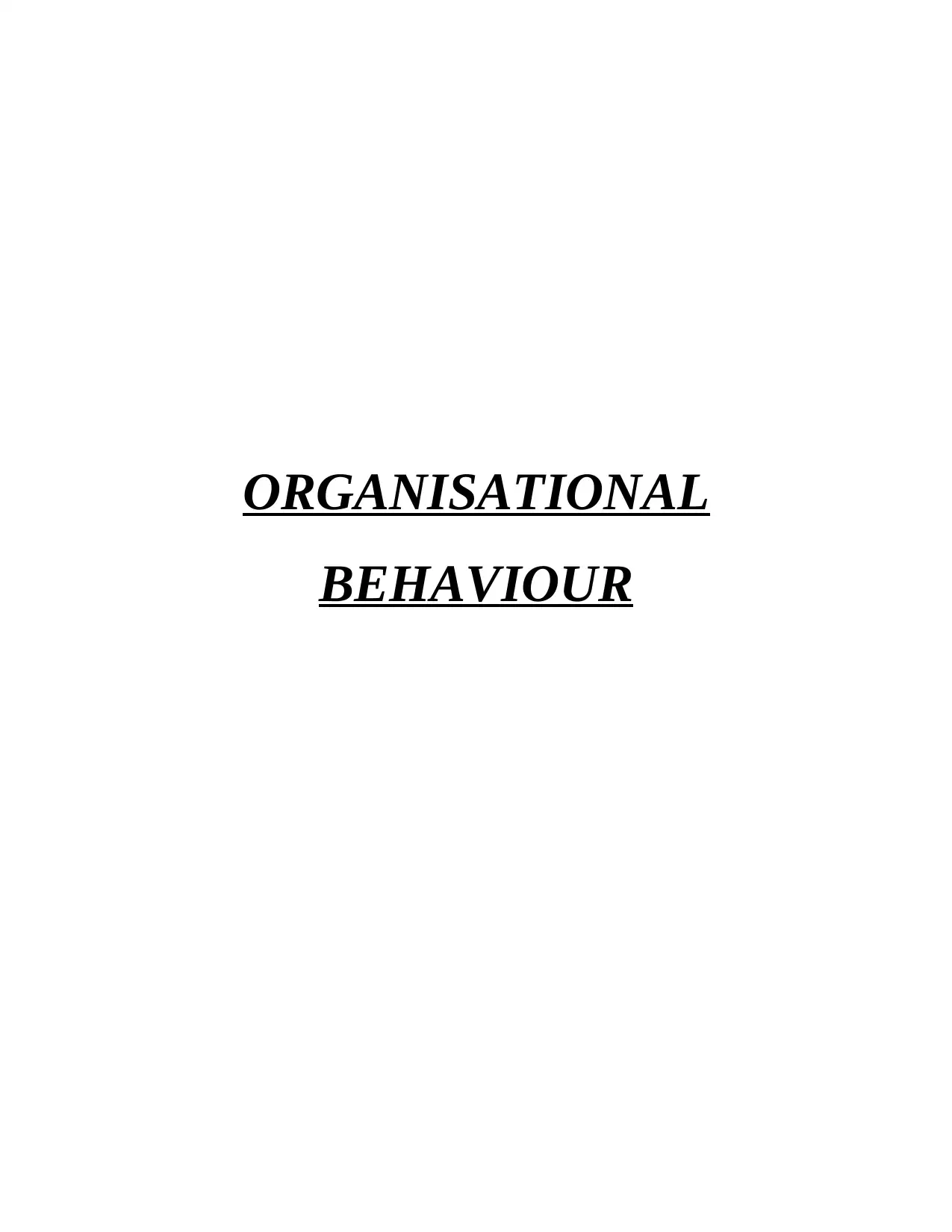
ORGANISATIONAL
BEHAVIOUR
BEHAVIOUR
Paraphrase This Document
Need a fresh take? Get an instant paraphrase of this document with our AI Paraphraser
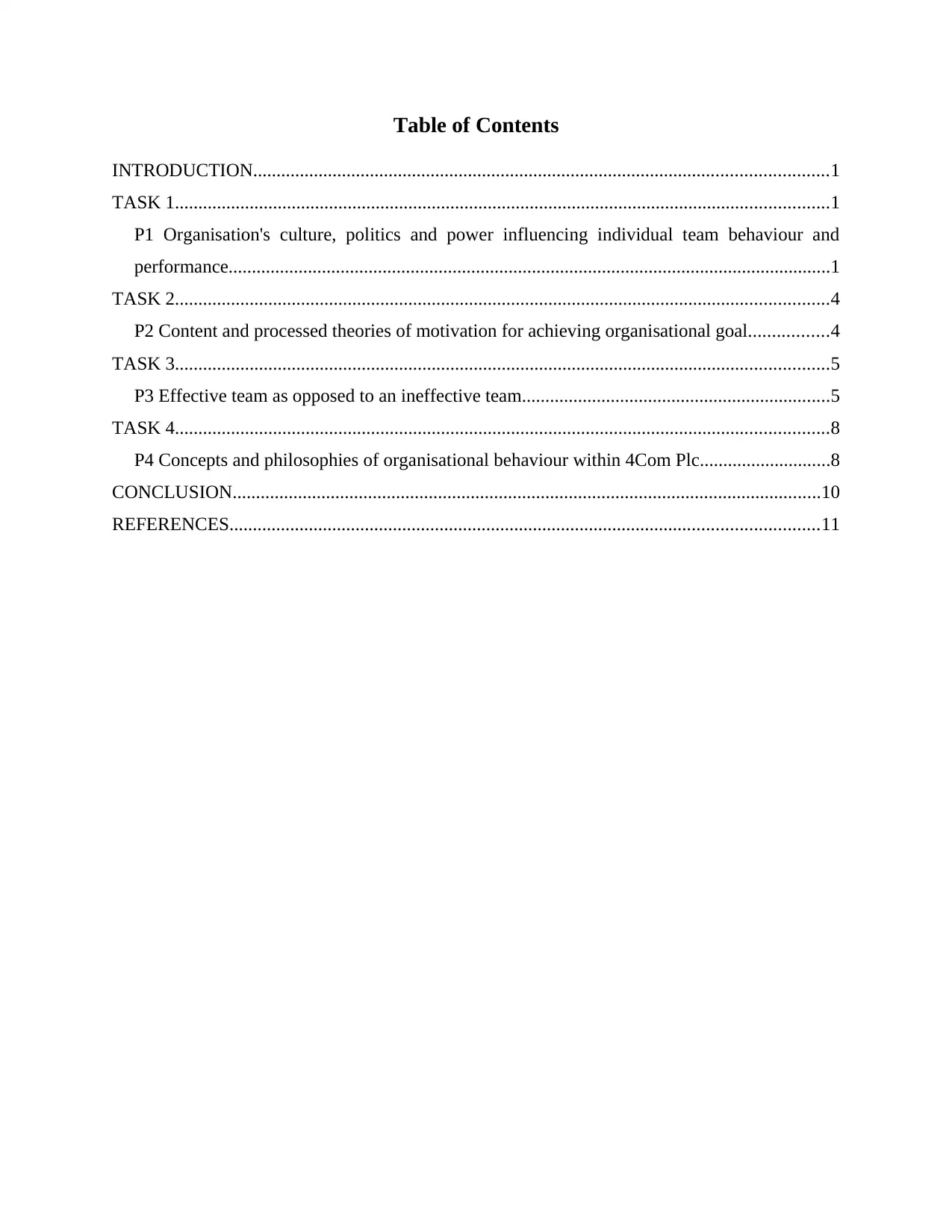
Table of Contents
INTRODUCTION...........................................................................................................................1
TASK 1............................................................................................................................................1
P1 Organisation's culture, politics and power influencing individual team behaviour and
performance.................................................................................................................................1
TASK 2............................................................................................................................................4
P2 Content and processed theories of motivation for achieving organisational goal.................4
TASK 3............................................................................................................................................5
P3 Effective team as opposed to an ineffective team..................................................................5
TASK 4............................................................................................................................................8
P4 Concepts and philosophies of organisational behaviour within 4Com Plc............................8
CONCLUSION..............................................................................................................................10
REFERENCES..............................................................................................................................11
INTRODUCTION...........................................................................................................................1
TASK 1............................................................................................................................................1
P1 Organisation's culture, politics and power influencing individual team behaviour and
performance.................................................................................................................................1
TASK 2............................................................................................................................................4
P2 Content and processed theories of motivation for achieving organisational goal.................4
TASK 3............................................................................................................................................5
P3 Effective team as opposed to an ineffective team..................................................................5
TASK 4............................................................................................................................................8
P4 Concepts and philosophies of organisational behaviour within 4Com Plc............................8
CONCLUSION..............................................................................................................................10
REFERENCES..............................................................................................................................11
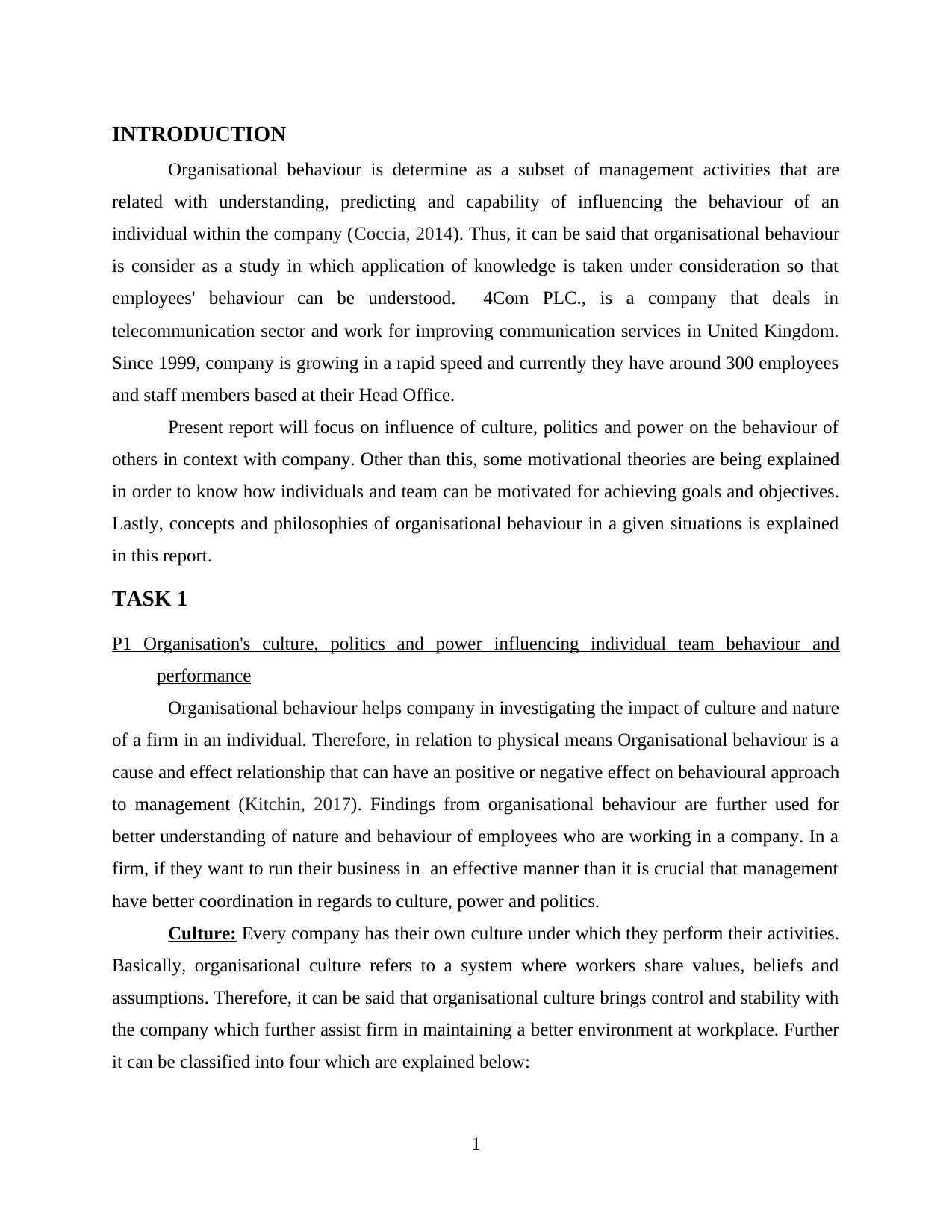
INTRODUCTION
Organisational behaviour is determine as a subset of management activities that are
related with understanding, predicting and capability of influencing the behaviour of an
individual within the company (Coccia, 2014). Thus, it can be said that organisational behaviour
is consider as a study in which application of knowledge is taken under consideration so that
employees' behaviour can be understood. 4Com PLC., is a company that deals in
telecommunication sector and work for improving communication services in United Kingdom.
Since 1999, company is growing in a rapid speed and currently they have around 300 employees
and staff members based at their Head Office.
Present report will focus on influence of culture, politics and power on the behaviour of
others in context with company. Other than this, some motivational theories are being explained
in order to know how individuals and team can be motivated for achieving goals and objectives.
Lastly, concepts and philosophies of organisational behaviour in a given situations is explained
in this report.
TASK 1
P1 Organisation's culture, politics and power influencing individual team behaviour and
performance
Organisational behaviour helps company in investigating the impact of culture and nature
of a firm in an individual. Therefore, in relation to physical means Organisational behaviour is a
cause and effect relationship that can have an positive or negative effect on behavioural approach
to management (Kitchin, 2017). Findings from organisational behaviour are further used for
better understanding of nature and behaviour of employees who are working in a company. In a
firm, if they want to run their business in an effective manner than it is crucial that management
have better coordination in regards to culture, power and politics.
Culture: Every company has their own culture under which they perform their activities.
Basically, organisational culture refers to a system where workers share values, beliefs and
assumptions. Therefore, it can be said that organisational culture brings control and stability with
the company which further assist firm in maintaining a better environment at workplace. Further
it can be classified into four which are explained below:
1
Organisational behaviour is determine as a subset of management activities that are
related with understanding, predicting and capability of influencing the behaviour of an
individual within the company (Coccia, 2014). Thus, it can be said that organisational behaviour
is consider as a study in which application of knowledge is taken under consideration so that
employees' behaviour can be understood. 4Com PLC., is a company that deals in
telecommunication sector and work for improving communication services in United Kingdom.
Since 1999, company is growing in a rapid speed and currently they have around 300 employees
and staff members based at their Head Office.
Present report will focus on influence of culture, politics and power on the behaviour of
others in context with company. Other than this, some motivational theories are being explained
in order to know how individuals and team can be motivated for achieving goals and objectives.
Lastly, concepts and philosophies of organisational behaviour in a given situations is explained
in this report.
TASK 1
P1 Organisation's culture, politics and power influencing individual team behaviour and
performance
Organisational behaviour helps company in investigating the impact of culture and nature
of a firm in an individual. Therefore, in relation to physical means Organisational behaviour is a
cause and effect relationship that can have an positive or negative effect on behavioural approach
to management (Kitchin, 2017). Findings from organisational behaviour are further used for
better understanding of nature and behaviour of employees who are working in a company. In a
firm, if they want to run their business in an effective manner than it is crucial that management
have better coordination in regards to culture, power and politics.
Culture: Every company has their own culture under which they perform their activities.
Basically, organisational culture refers to a system where workers share values, beliefs and
assumptions. Therefore, it can be said that organisational culture brings control and stability with
the company which further assist firm in maintaining a better environment at workplace. Further
it can be classified into four which are explained below:
1
⊘ This is a preview!⊘
Do you want full access?
Subscribe today to unlock all pages.

Trusted by 1+ million students worldwide
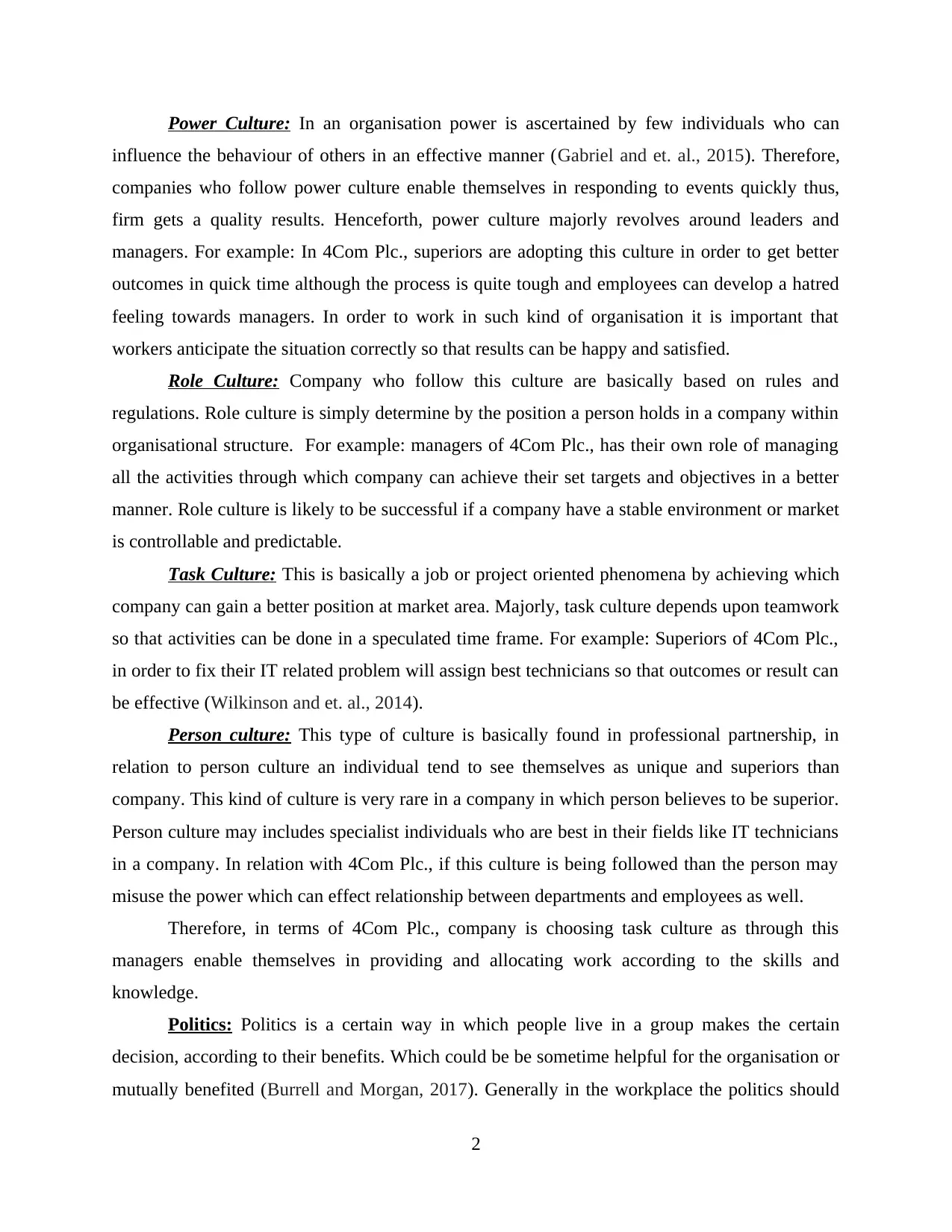
Power Culture: In an organisation power is ascertained by few individuals who can
influence the behaviour of others in an effective manner (Gabriel and et. al., 2015). Therefore,
companies who follow power culture enable themselves in responding to events quickly thus,
firm gets a quality results. Henceforth, power culture majorly revolves around leaders and
managers. For example: In 4Com Plc., superiors are adopting this culture in order to get better
outcomes in quick time although the process is quite tough and employees can develop a hatred
feeling towards managers. In order to work in such kind of organisation it is important that
workers anticipate the situation correctly so that results can be happy and satisfied.
Role Culture: Company who follow this culture are basically based on rules and
regulations. Role culture is simply determine by the position a person holds in a company within
organisational structure. For example: managers of 4Com Plc., has their own role of managing
all the activities through which company can achieve their set targets and objectives in a better
manner. Role culture is likely to be successful if a company have a stable environment or market
is controllable and predictable.
Task Culture: This is basically a job or project oriented phenomena by achieving which
company can gain a better position at market area. Majorly, task culture depends upon teamwork
so that activities can be done in a speculated time frame. For example: Superiors of 4Com Plc.,
in order to fix their IT related problem will assign best technicians so that outcomes or result can
be effective (Wilkinson and et. al., 2014).
Person culture: This type of culture is basically found in professional partnership, in
relation to person culture an individual tend to see themselves as unique and superiors than
company. This kind of culture is very rare in a company in which person believes to be superior.
Person culture may includes specialist individuals who are best in their fields like IT technicians
in a company. In relation with 4Com Plc., if this culture is being followed than the person may
misuse the power which can effect relationship between departments and employees as well.
Therefore, in terms of 4Com Plc., company is choosing task culture as through this
managers enable themselves in providing and allocating work according to the skills and
knowledge.
Politics: Politics is a certain way in which people live in a group makes the certain
decision, according to their benefits. Which could be be sometime helpful for the organisation or
mutually benefited (Burrell and Morgan, 2017). Generally in the workplace the politics should
2
influence the behaviour of others in an effective manner (Gabriel and et. al., 2015). Therefore,
companies who follow power culture enable themselves in responding to events quickly thus,
firm gets a quality results. Henceforth, power culture majorly revolves around leaders and
managers. For example: In 4Com Plc., superiors are adopting this culture in order to get better
outcomes in quick time although the process is quite tough and employees can develop a hatred
feeling towards managers. In order to work in such kind of organisation it is important that
workers anticipate the situation correctly so that results can be happy and satisfied.
Role Culture: Company who follow this culture are basically based on rules and
regulations. Role culture is simply determine by the position a person holds in a company within
organisational structure. For example: managers of 4Com Plc., has their own role of managing
all the activities through which company can achieve their set targets and objectives in a better
manner. Role culture is likely to be successful if a company have a stable environment or market
is controllable and predictable.
Task Culture: This is basically a job or project oriented phenomena by achieving which
company can gain a better position at market area. Majorly, task culture depends upon teamwork
so that activities can be done in a speculated time frame. For example: Superiors of 4Com Plc.,
in order to fix their IT related problem will assign best technicians so that outcomes or result can
be effective (Wilkinson and et. al., 2014).
Person culture: This type of culture is basically found in professional partnership, in
relation to person culture an individual tend to see themselves as unique and superiors than
company. This kind of culture is very rare in a company in which person believes to be superior.
Person culture may includes specialist individuals who are best in their fields like IT technicians
in a company. In relation with 4Com Plc., if this culture is being followed than the person may
misuse the power which can effect relationship between departments and employees as well.
Therefore, in terms of 4Com Plc., company is choosing task culture as through this
managers enable themselves in providing and allocating work according to the skills and
knowledge.
Politics: Politics is a certain way in which people live in a group makes the certain
decision, according to their benefits. Which could be be sometime helpful for the organisation or
mutually benefited (Burrell and Morgan, 2017). Generally in the workplace the politics should
2
Paraphrase This Document
Need a fresh take? Get an instant paraphrase of this document with our AI Paraphraser
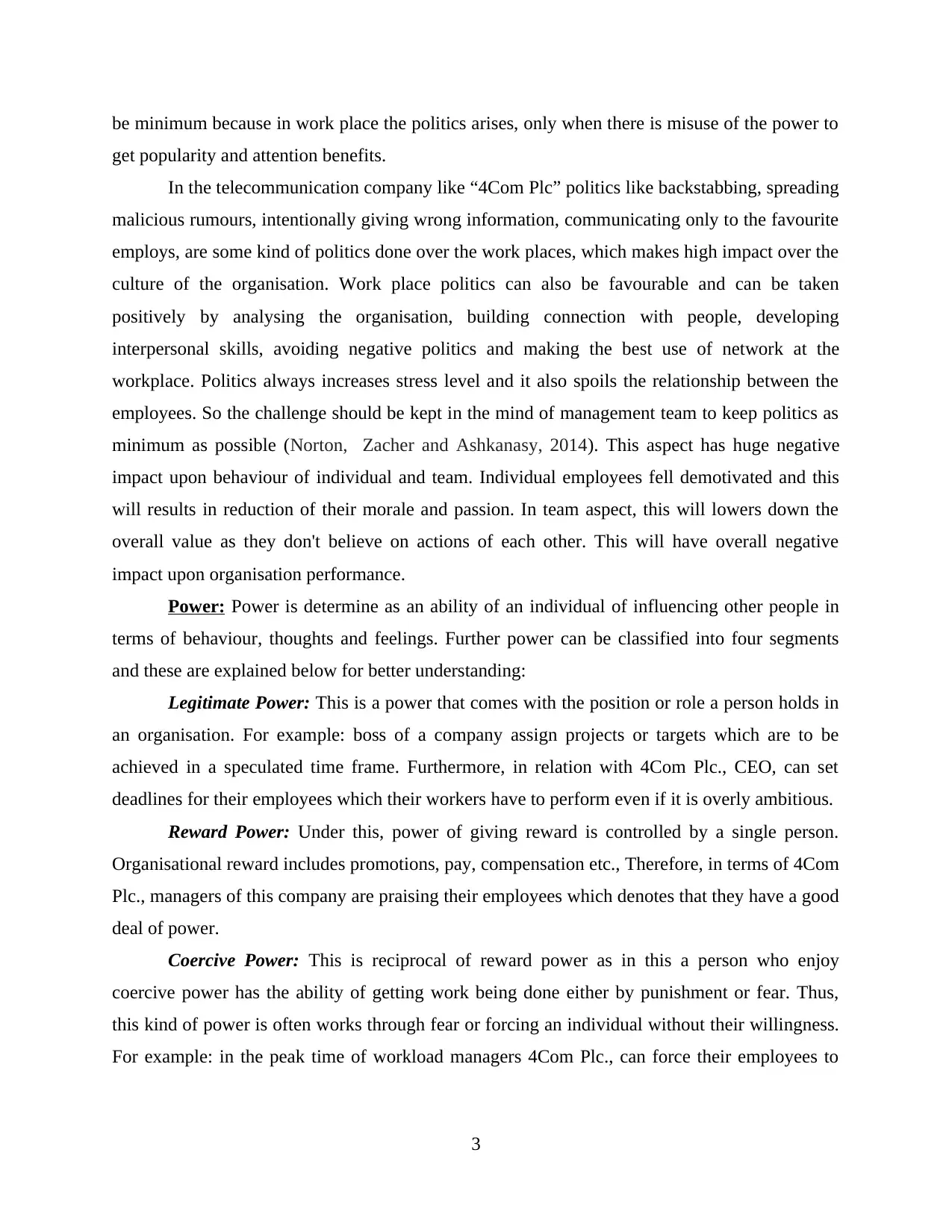
be minimum because in work place the politics arises, only when there is misuse of the power to
get popularity and attention benefits.
In the telecommunication company like “4Com Plc” politics like backstabbing, spreading
malicious rumours, intentionally giving wrong information, communicating only to the favourite
employs, are some kind of politics done over the work places, which makes high impact over the
culture of the organisation. Work place politics can also be favourable and can be taken
positively by analysing the organisation, building connection with people, developing
interpersonal skills, avoiding negative politics and making the best use of network at the
workplace. Politics always increases stress level and it also spoils the relationship between the
employees. So the challenge should be kept in the mind of management team to keep politics as
minimum as possible (Norton, Zacher and Ashkanasy, 2014). This aspect has huge negative
impact upon behaviour of individual and team. Individual employees fell demotivated and this
will results in reduction of their morale and passion. In team aspect, this will lowers down the
overall value as they don't believe on actions of each other. This will have overall negative
impact upon organisation performance.
Power: Power is determine as an ability of an individual of influencing other people in
terms of behaviour, thoughts and feelings. Further power can be classified into four segments
and these are explained below for better understanding:
Legitimate Power: This is a power that comes with the position or role a person holds in
an organisation. For example: boss of a company assign projects or targets which are to be
achieved in a speculated time frame. Furthermore, in relation with 4Com Plc., CEO, can set
deadlines for their employees which their workers have to perform even if it is overly ambitious.
Reward Power: Under this, power of giving reward is controlled by a single person.
Organisational reward includes promotions, pay, compensation etc., Therefore, in terms of 4Com
Plc., managers of this company are praising their employees which denotes that they have a good
deal of power.
Coercive Power: This is reciprocal of reward power as in this a person who enjoy
coercive power has the ability of getting work being done either by punishment or fear. Thus,
this kind of power is often works through fear or forcing an individual without their willingness.
For example: in the peak time of workload managers 4Com Plc., can force their employees to
3
get popularity and attention benefits.
In the telecommunication company like “4Com Plc” politics like backstabbing, spreading
malicious rumours, intentionally giving wrong information, communicating only to the favourite
employs, are some kind of politics done over the work places, which makes high impact over the
culture of the organisation. Work place politics can also be favourable and can be taken
positively by analysing the organisation, building connection with people, developing
interpersonal skills, avoiding negative politics and making the best use of network at the
workplace. Politics always increases stress level and it also spoils the relationship between the
employees. So the challenge should be kept in the mind of management team to keep politics as
minimum as possible (Norton, Zacher and Ashkanasy, 2014). This aspect has huge negative
impact upon behaviour of individual and team. Individual employees fell demotivated and this
will results in reduction of their morale and passion. In team aspect, this will lowers down the
overall value as they don't believe on actions of each other. This will have overall negative
impact upon organisation performance.
Power: Power is determine as an ability of an individual of influencing other people in
terms of behaviour, thoughts and feelings. Further power can be classified into four segments
and these are explained below for better understanding:
Legitimate Power: This is a power that comes with the position or role a person holds in
an organisation. For example: boss of a company assign projects or targets which are to be
achieved in a speculated time frame. Furthermore, in relation with 4Com Plc., CEO, can set
deadlines for their employees which their workers have to perform even if it is overly ambitious.
Reward Power: Under this, power of giving reward is controlled by a single person.
Organisational reward includes promotions, pay, compensation etc., Therefore, in terms of 4Com
Plc., managers of this company are praising their employees which denotes that they have a good
deal of power.
Coercive Power: This is reciprocal of reward power as in this a person who enjoy
coercive power has the ability of getting work being done either by punishment or fear. Thus,
this kind of power is often works through fear or forcing an individual without their willingness.
For example: in the peak time of workload managers 4Com Plc., can force their employees to
3
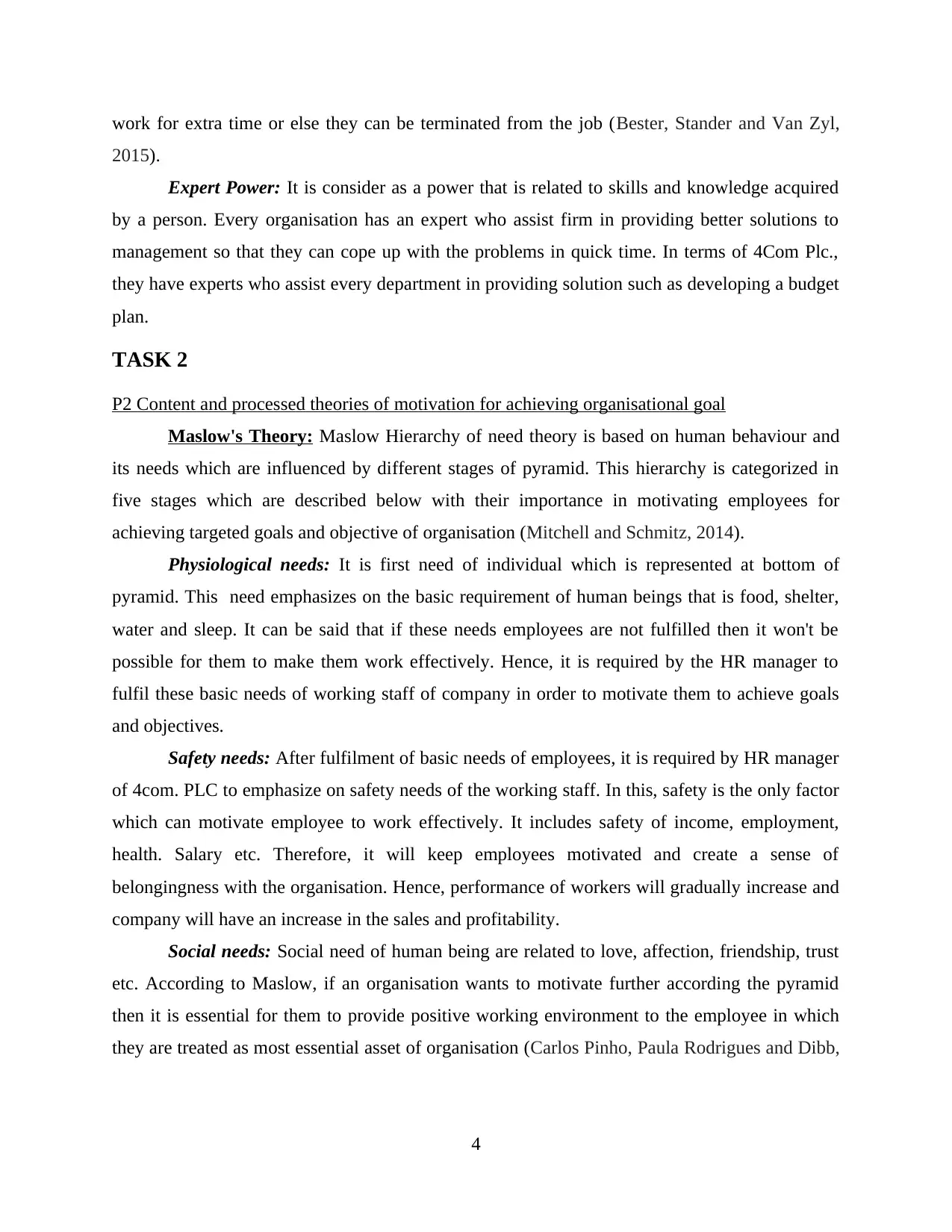
work for extra time or else they can be terminated from the job (Bester, Stander and Van Zyl,
2015).
Expert Power: It is consider as a power that is related to skills and knowledge acquired
by a person. Every organisation has an expert who assist firm in providing better solutions to
management so that they can cope up with the problems in quick time. In terms of 4Com Plc.,
they have experts who assist every department in providing solution such as developing a budget
plan.
TASK 2
P2 Content and processed theories of motivation for achieving organisational goal
Maslow's Theory: Maslow Hierarchy of need theory is based on human behaviour and
its needs which are influenced by different stages of pyramid. This hierarchy is categorized in
five stages which are described below with their importance in motivating employees for
achieving targeted goals and objective of organisation (Mitchell and Schmitz, 2014).
Physiological needs: It is first need of individual which is represented at bottom of
pyramid. This need emphasizes on the basic requirement of human beings that is food, shelter,
water and sleep. It can be said that if these needs employees are not fulfilled then it won't be
possible for them to make them work effectively. Hence, it is required by the HR manager to
fulfil these basic needs of working staff of company in order to motivate them to achieve goals
and objectives.
Safety needs: After fulfilment of basic needs of employees, it is required by HR manager
of 4com. PLC to emphasize on safety needs of the working staff. In this, safety is the only factor
which can motivate employee to work effectively. It includes safety of income, employment,
health. Salary etc. Therefore, it will keep employees motivated and create a sense of
belongingness with the organisation. Hence, performance of workers will gradually increase and
company will have an increase in the sales and profitability.
Social needs: Social need of human being are related to love, affection, friendship, trust
etc. According to Maslow, if an organisation wants to motivate further according the pyramid
then it is essential for them to provide positive working environment to the employee in which
they are treated as most essential asset of organisation (Carlos Pinho, Paula Rodrigues and Dibb,
4
2015).
Expert Power: It is consider as a power that is related to skills and knowledge acquired
by a person. Every organisation has an expert who assist firm in providing better solutions to
management so that they can cope up with the problems in quick time. In terms of 4Com Plc.,
they have experts who assist every department in providing solution such as developing a budget
plan.
TASK 2
P2 Content and processed theories of motivation for achieving organisational goal
Maslow's Theory: Maslow Hierarchy of need theory is based on human behaviour and
its needs which are influenced by different stages of pyramid. This hierarchy is categorized in
five stages which are described below with their importance in motivating employees for
achieving targeted goals and objective of organisation (Mitchell and Schmitz, 2014).
Physiological needs: It is first need of individual which is represented at bottom of
pyramid. This need emphasizes on the basic requirement of human beings that is food, shelter,
water and sleep. It can be said that if these needs employees are not fulfilled then it won't be
possible for them to make them work effectively. Hence, it is required by the HR manager to
fulfil these basic needs of working staff of company in order to motivate them to achieve goals
and objectives.
Safety needs: After fulfilment of basic needs of employees, it is required by HR manager
of 4com. PLC to emphasize on safety needs of the working staff. In this, safety is the only factor
which can motivate employee to work effectively. It includes safety of income, employment,
health. Salary etc. Therefore, it will keep employees motivated and create a sense of
belongingness with the organisation. Hence, performance of workers will gradually increase and
company will have an increase in the sales and profitability.
Social needs: Social need of human being are related to love, affection, friendship, trust
etc. According to Maslow, if an organisation wants to motivate further according the pyramid
then it is essential for them to provide positive working environment to the employee in which
they are treated as most essential asset of organisation (Carlos Pinho, Paula Rodrigues and Dibb,
4
⊘ This is a preview!⊘
Do you want full access?
Subscribe today to unlock all pages.

Trusted by 1+ million students worldwide
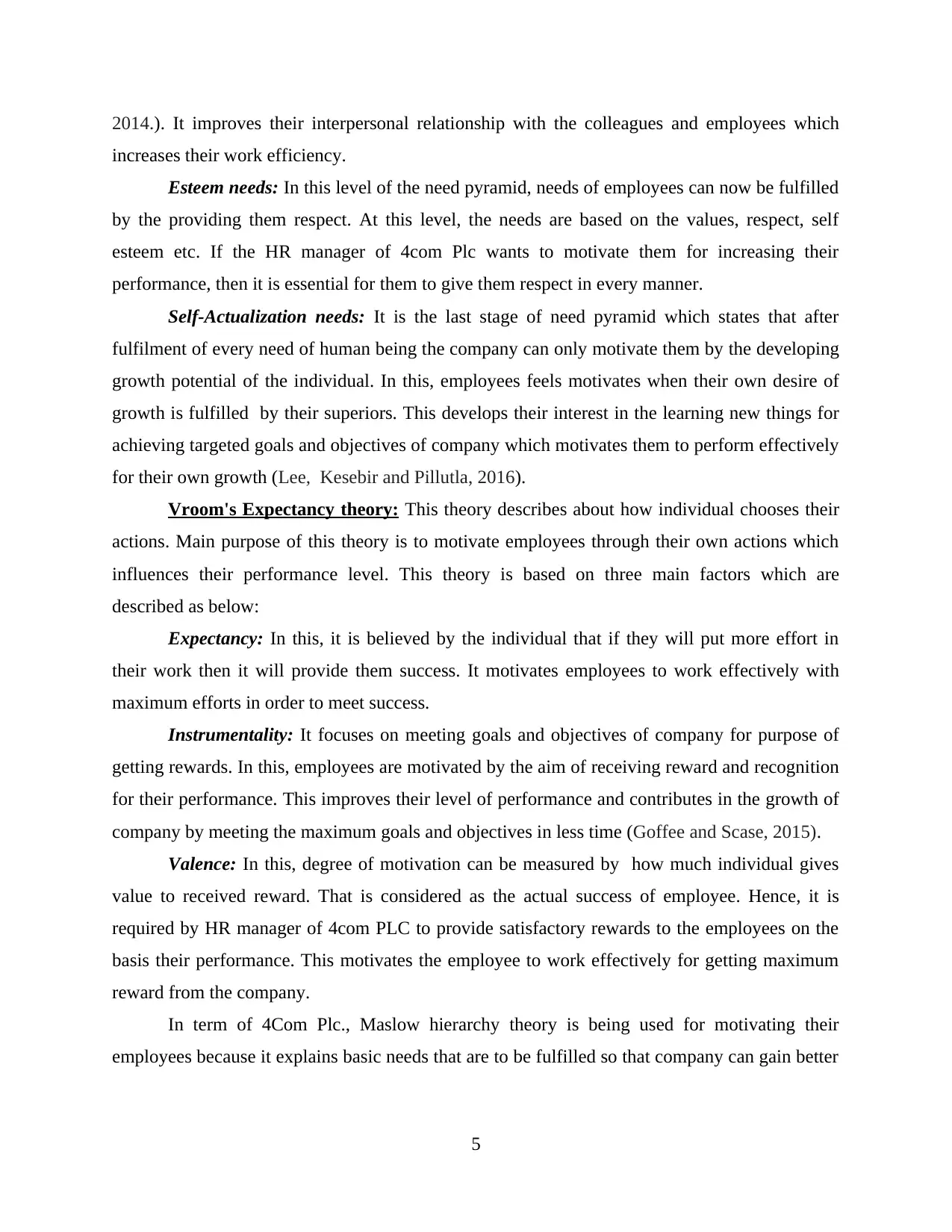
2014.). It improves their interpersonal relationship with the colleagues and employees which
increases their work efficiency.
Esteem needs: In this level of the need pyramid, needs of employees can now be fulfilled
by the providing them respect. At this level, the needs are based on the values, respect, self
esteem etc. If the HR manager of 4com Plc wants to motivate them for increasing their
performance, then it is essential for them to give them respect in every manner.
Self-Actualization needs: It is the last stage of need pyramid which states that after
fulfilment of every need of human being the company can only motivate them by the developing
growth potential of the individual. In this, employees feels motivates when their own desire of
growth is fulfilled by their superiors. This develops their interest in the learning new things for
achieving targeted goals and objectives of company which motivates them to perform effectively
for their own growth (Lee, Kesebir and Pillutla, 2016).
Vroom's Expectancy theory: This theory describes about how individual chooses their
actions. Main purpose of this theory is to motivate employees through their own actions which
influences their performance level. This theory is based on three main factors which are
described as below:
Expectancy: In this, it is believed by the individual that if they will put more effort in
their work then it will provide them success. It motivates employees to work effectively with
maximum efforts in order to meet success.
Instrumentality: It focuses on meeting goals and objectives of company for purpose of
getting rewards. In this, employees are motivated by the aim of receiving reward and recognition
for their performance. This improves their level of performance and contributes in the growth of
company by meeting the maximum goals and objectives in less time (Goffee and Scase, 2015).
Valence: In this, degree of motivation can be measured by how much individual gives
value to received reward. That is considered as the actual success of employee. Hence, it is
required by HR manager of 4com PLC to provide satisfactory rewards to the employees on the
basis their performance. This motivates the employee to work effectively for getting maximum
reward from the company.
In term of 4Com Plc., Maslow hierarchy theory is being used for motivating their
employees because it explains basic needs that are to be fulfilled so that company can gain better
5
increases their work efficiency.
Esteem needs: In this level of the need pyramid, needs of employees can now be fulfilled
by the providing them respect. At this level, the needs are based on the values, respect, self
esteem etc. If the HR manager of 4com Plc wants to motivate them for increasing their
performance, then it is essential for them to give them respect in every manner.
Self-Actualization needs: It is the last stage of need pyramid which states that after
fulfilment of every need of human being the company can only motivate them by the developing
growth potential of the individual. In this, employees feels motivates when their own desire of
growth is fulfilled by their superiors. This develops their interest in the learning new things for
achieving targeted goals and objectives of company which motivates them to perform effectively
for their own growth (Lee, Kesebir and Pillutla, 2016).
Vroom's Expectancy theory: This theory describes about how individual chooses their
actions. Main purpose of this theory is to motivate employees through their own actions which
influences their performance level. This theory is based on three main factors which are
described as below:
Expectancy: In this, it is believed by the individual that if they will put more effort in
their work then it will provide them success. It motivates employees to work effectively with
maximum efforts in order to meet success.
Instrumentality: It focuses on meeting goals and objectives of company for purpose of
getting rewards. In this, employees are motivated by the aim of receiving reward and recognition
for their performance. This improves their level of performance and contributes in the growth of
company by meeting the maximum goals and objectives in less time (Goffee and Scase, 2015).
Valence: In this, degree of motivation can be measured by how much individual gives
value to received reward. That is considered as the actual success of employee. Hence, it is
required by HR manager of 4com PLC to provide satisfactory rewards to the employees on the
basis their performance. This motivates the employee to work effectively for getting maximum
reward from the company.
In term of 4Com Plc., Maslow hierarchy theory is being used for motivating their
employees because it explains basic needs that are to be fulfilled so that company can gain better
5
Paraphrase This Document
Need a fresh take? Get an instant paraphrase of this document with our AI Paraphraser

results. Therefore, through this, employees can feel themselves connected with company and
hence it will develop a belongingness towards the organisation.
TASK 3
P3 Effective team as opposed to an ineffective team
Effective team: A team is a group of individuals who are dependent on each other to
complete their task assigned by authorized person of organization. An effective team has
members with good skills and ability to do allotted work. Team members clearly understands
their responsibilities to achieve their goals. In case of 4Com plc, Effective team always have
good process for effective communication and coordinating between team members (Tangaraja,
and et. al., 2015). Productive teams are always open to express their views and willing to work in
hard conditions. They accept each others ideas, strengths and weaknesses. Effective team always
review their performances to check progress for achieving goals.
Ineffective team: These are the teams where members are not focused towards their
work. They don't realize their responsibilities for achievement of team goals. Unfocused team
members reduces effectiveness of teamwork and low unity. They use to avoid any kind of
discussion related to their work and they never comes to a mutual decision. In case of 4Com plc,
Ineffective team members have low performance and few of them dominate other group
members. They do not share their ideas with others and have a high feeling of competition.
These teams never complete their task on given time period.
Belbin team roles model
Following are some team role models:
Action Oriented
Shaper: These are persons who initiate changes in team and take problems as challenges.
For 4Com Plc, shapers are people who find out new approaches to solve problems.
Implementer: These people do work in a systematic manner (Sawang, Parker and Hine,
2016). In case of 4Com Plc, these persons convert ideas into actions.
Completer-Finisher: These person analyse whole project deeply. In case of 4Com Plc,
these are person who are concerned for completing work on time.
People oriented
6
hence it will develop a belongingness towards the organisation.
TASK 3
P3 Effective team as opposed to an ineffective team
Effective team: A team is a group of individuals who are dependent on each other to
complete their task assigned by authorized person of organization. An effective team has
members with good skills and ability to do allotted work. Team members clearly understands
their responsibilities to achieve their goals. In case of 4Com plc, Effective team always have
good process for effective communication and coordinating between team members (Tangaraja,
and et. al., 2015). Productive teams are always open to express their views and willing to work in
hard conditions. They accept each others ideas, strengths and weaknesses. Effective team always
review their performances to check progress for achieving goals.
Ineffective team: These are the teams where members are not focused towards their
work. They don't realize their responsibilities for achievement of team goals. Unfocused team
members reduces effectiveness of teamwork and low unity. They use to avoid any kind of
discussion related to their work and they never comes to a mutual decision. In case of 4Com plc,
Ineffective team members have low performance and few of them dominate other group
members. They do not share their ideas with others and have a high feeling of competition.
These teams never complete their task on given time period.
Belbin team roles model
Following are some team role models:
Action Oriented
Shaper: These are persons who initiate changes in team and take problems as challenges.
For 4Com Plc, shapers are people who find out new approaches to solve problems.
Implementer: These people do work in a systematic manner (Sawang, Parker and Hine,
2016). In case of 4Com Plc, these persons convert ideas into actions.
Completer-Finisher: These person analyse whole project deeply. In case of 4Com Plc,
these are person who are concerned for completing work on time.
People oriented
6
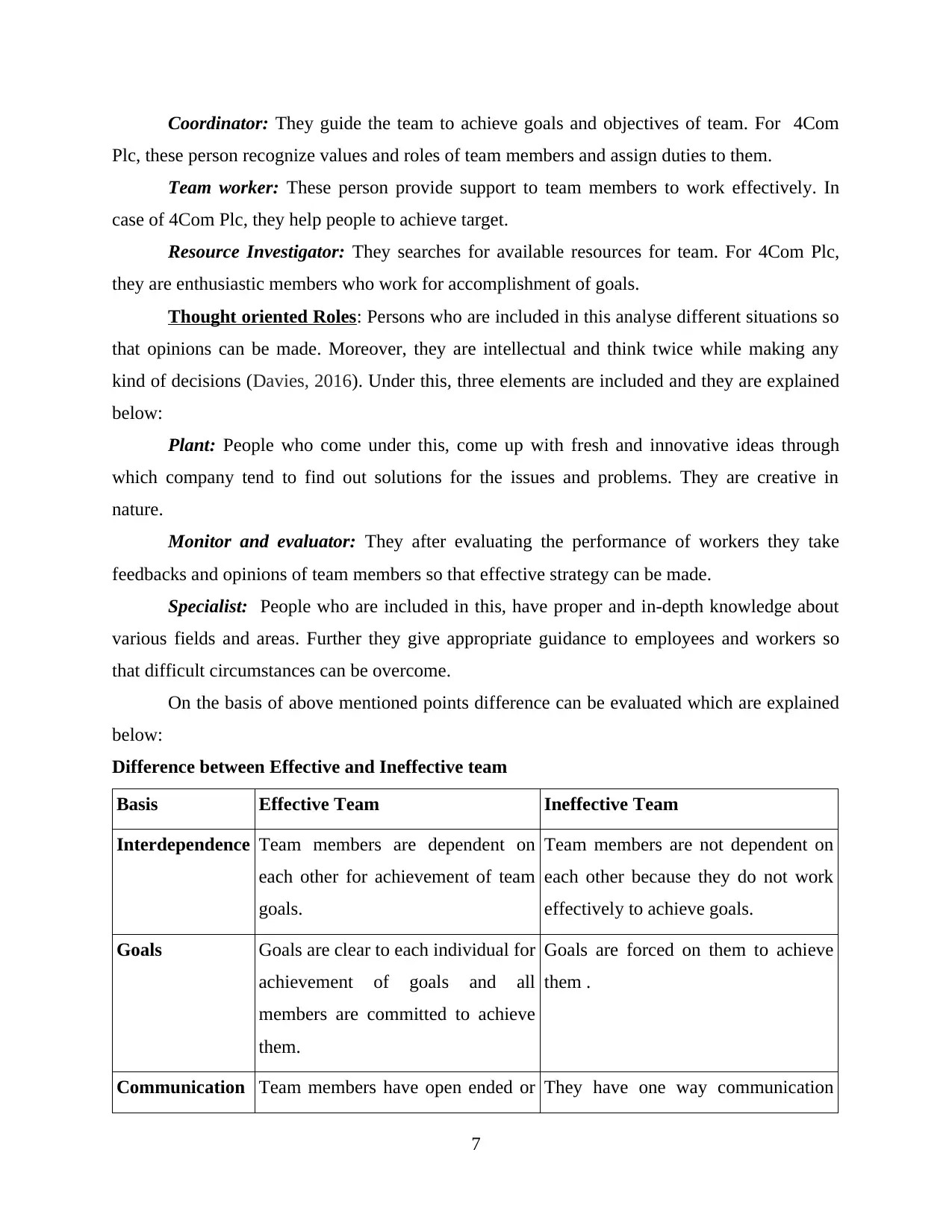
Coordinator: They guide the team to achieve goals and objectives of team. For 4Com
Plc, these person recognize values and roles of team members and assign duties to them.
Team worker: These person provide support to team members to work effectively. In
case of 4Com Plc, they help people to achieve target.
Resource Investigator: They searches for available resources for team. For 4Com Plc,
they are enthusiastic members who work for accomplishment of goals.
Thought oriented Roles: Persons who are included in this analyse different situations so
that opinions can be made. Moreover, they are intellectual and think twice while making any
kind of decisions (Davies, 2016). Under this, three elements are included and they are explained
below:
Plant: People who come under this, come up with fresh and innovative ideas through
which company tend to find out solutions for the issues and problems. They are creative in
nature.
Monitor and evaluator: They after evaluating the performance of workers they take
feedbacks and opinions of team members so that effective strategy can be made.
Specialist: People who are included in this, have proper and in-depth knowledge about
various fields and areas. Further they give appropriate guidance to employees and workers so
that difficult circumstances can be overcome.
On the basis of above mentioned points difference can be evaluated which are explained
below:
Difference between Effective and Ineffective team
Basis Effective Team Ineffective Team
Interdependence Team members are dependent on
each other for achievement of team
goals.
Team members are not dependent on
each other because they do not work
effectively to achieve goals.
Goals Goals are clear to each individual for
achievement of goals and all
members are committed to achieve
them.
Goals are forced on them to achieve
them .
Communication Team members have open ended or They have one way communication
7
Plc, these person recognize values and roles of team members and assign duties to them.
Team worker: These person provide support to team members to work effectively. In
case of 4Com Plc, they help people to achieve target.
Resource Investigator: They searches for available resources for team. For 4Com Plc,
they are enthusiastic members who work for accomplishment of goals.
Thought oriented Roles: Persons who are included in this analyse different situations so
that opinions can be made. Moreover, they are intellectual and think twice while making any
kind of decisions (Davies, 2016). Under this, three elements are included and they are explained
below:
Plant: People who come under this, come up with fresh and innovative ideas through
which company tend to find out solutions for the issues and problems. They are creative in
nature.
Monitor and evaluator: They after evaluating the performance of workers they take
feedbacks and opinions of team members so that effective strategy can be made.
Specialist: People who are included in this, have proper and in-depth knowledge about
various fields and areas. Further they give appropriate guidance to employees and workers so
that difficult circumstances can be overcome.
On the basis of above mentioned points difference can be evaluated which are explained
below:
Difference between Effective and Ineffective team
Basis Effective Team Ineffective Team
Interdependence Team members are dependent on
each other for achievement of team
goals.
Team members are not dependent on
each other because they do not work
effectively to achieve goals.
Goals Goals are clear to each individual for
achievement of goals and all
members are committed to achieve
them.
Goals are forced on them to achieve
them .
Communication Team members have open ended or They have one way communication
7
⊘ This is a preview!⊘
Do you want full access?
Subscribe today to unlock all pages.

Trusted by 1+ million students worldwide
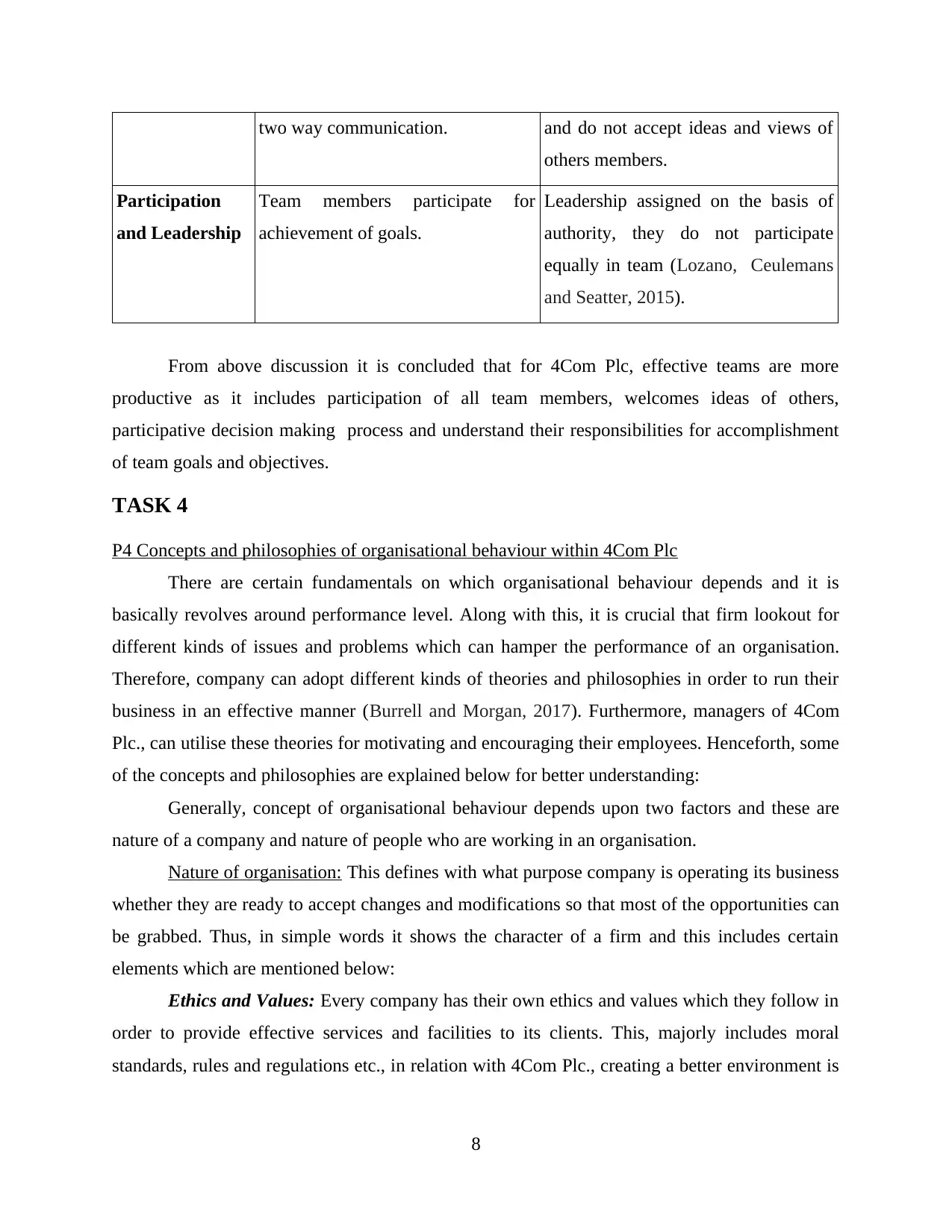
two way communication. and do not accept ideas and views of
others members.
Participation
and Leadership
Team members participate for
achievement of goals.
Leadership assigned on the basis of
authority, they do not participate
equally in team (Lozano, Ceulemans
and Seatter, 2015).
From above discussion it is concluded that for 4Com Plc, effective teams are more
productive as it includes participation of all team members, welcomes ideas of others,
participative decision making process and understand their responsibilities for accomplishment
of team goals and objectives.
TASK 4
P4 Concepts and philosophies of organisational behaviour within 4Com Plc
There are certain fundamentals on which organisational behaviour depends and it is
basically revolves around performance level. Along with this, it is crucial that firm lookout for
different kinds of issues and problems which can hamper the performance of an organisation.
Therefore, company can adopt different kinds of theories and philosophies in order to run their
business in an effective manner (Burrell and Morgan, 2017). Furthermore, managers of 4Com
Plc., can utilise these theories for motivating and encouraging their employees. Henceforth, some
of the concepts and philosophies are explained below for better understanding:
Generally, concept of organisational behaviour depends upon two factors and these are
nature of a company and nature of people who are working in an organisation.
Nature of organisation: This defines with what purpose company is operating its business
whether they are ready to accept changes and modifications so that most of the opportunities can
be grabbed. Thus, in simple words it shows the character of a firm and this includes certain
elements which are mentioned below:
Ethics and Values: Every company has their own ethics and values which they follow in
order to provide effective services and facilities to its clients. This, majorly includes moral
standards, rules and regulations etc., in relation with 4Com Plc., creating a better environment is
8
others members.
Participation
and Leadership
Team members participate for
achievement of goals.
Leadership assigned on the basis of
authority, they do not participate
equally in team (Lozano, Ceulemans
and Seatter, 2015).
From above discussion it is concluded that for 4Com Plc, effective teams are more
productive as it includes participation of all team members, welcomes ideas of others,
participative decision making process and understand their responsibilities for accomplishment
of team goals and objectives.
TASK 4
P4 Concepts and philosophies of organisational behaviour within 4Com Plc
There are certain fundamentals on which organisational behaviour depends and it is
basically revolves around performance level. Along with this, it is crucial that firm lookout for
different kinds of issues and problems which can hamper the performance of an organisation.
Therefore, company can adopt different kinds of theories and philosophies in order to run their
business in an effective manner (Burrell and Morgan, 2017). Furthermore, managers of 4Com
Plc., can utilise these theories for motivating and encouraging their employees. Henceforth, some
of the concepts and philosophies are explained below for better understanding:
Generally, concept of organisational behaviour depends upon two factors and these are
nature of a company and nature of people who are working in an organisation.
Nature of organisation: This defines with what purpose company is operating its business
whether they are ready to accept changes and modifications so that most of the opportunities can
be grabbed. Thus, in simple words it shows the character of a firm and this includes certain
elements which are mentioned below:
Ethics and Values: Every company has their own ethics and values which they follow in
order to provide effective services and facilities to its clients. This, majorly includes moral
standards, rules and regulations etc., in relation with 4Com Plc., creating a better environment is
8
Paraphrase This Document
Need a fresh take? Get an instant paraphrase of this document with our AI Paraphraser
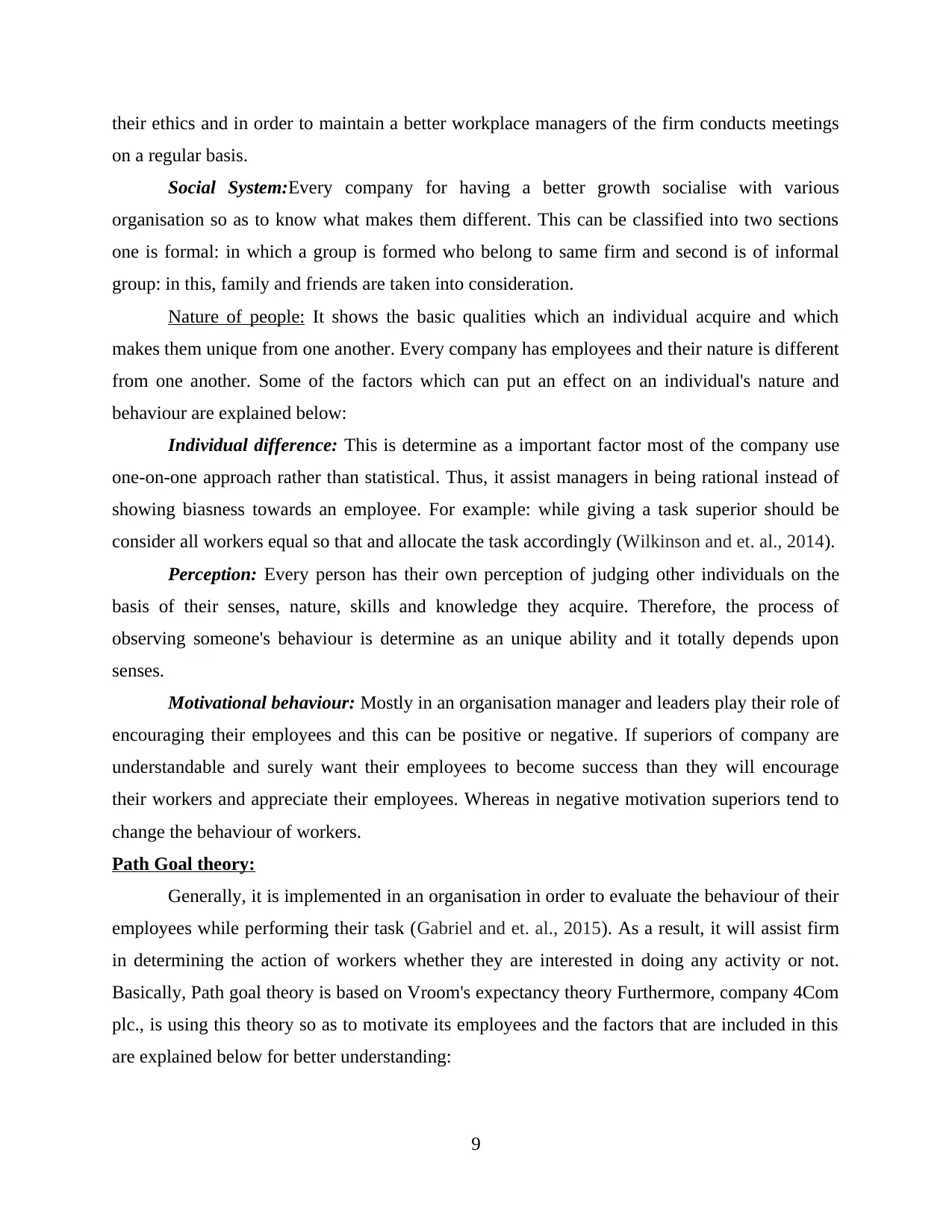
their ethics and in order to maintain a better workplace managers of the firm conducts meetings
on a regular basis.
Social System:Every company for having a better growth socialise with various
organisation so as to know what makes them different. This can be classified into two sections
one is formal: in which a group is formed who belong to same firm and second is of informal
group: in this, family and friends are taken into consideration.
Nature of people: It shows the basic qualities which an individual acquire and which
makes them unique from one another. Every company has employees and their nature is different
from one another. Some of the factors which can put an effect on an individual's nature and
behaviour are explained below:
Individual difference: This is determine as a important factor most of the company use
one-on-one approach rather than statistical. Thus, it assist managers in being rational instead of
showing biasness towards an employee. For example: while giving a task superior should be
consider all workers equal so that and allocate the task accordingly (Wilkinson and et. al., 2014).
Perception: Every person has their own perception of judging other individuals on the
basis of their senses, nature, skills and knowledge they acquire. Therefore, the process of
observing someone's behaviour is determine as an unique ability and it totally depends upon
senses.
Motivational behaviour: Mostly in an organisation manager and leaders play their role of
encouraging their employees and this can be positive or negative. If superiors of company are
understandable and surely want their employees to become success than they will encourage
their workers and appreciate their employees. Whereas in negative motivation superiors tend to
change the behaviour of workers.
Path Goal theory:
Generally, it is implemented in an organisation in order to evaluate the behaviour of their
employees while performing their task (Gabriel and et. al., 2015). As a result, it will assist firm
in determining the action of workers whether they are interested in doing any activity or not.
Basically, Path goal theory is based on Vroom's expectancy theory Furthermore, company 4Com
plc., is using this theory so as to motivate its employees and the factors that are included in this
are explained below for better understanding:
9
on a regular basis.
Social System:Every company for having a better growth socialise with various
organisation so as to know what makes them different. This can be classified into two sections
one is formal: in which a group is formed who belong to same firm and second is of informal
group: in this, family and friends are taken into consideration.
Nature of people: It shows the basic qualities which an individual acquire and which
makes them unique from one another. Every company has employees and their nature is different
from one another. Some of the factors which can put an effect on an individual's nature and
behaviour are explained below:
Individual difference: This is determine as a important factor most of the company use
one-on-one approach rather than statistical. Thus, it assist managers in being rational instead of
showing biasness towards an employee. For example: while giving a task superior should be
consider all workers equal so that and allocate the task accordingly (Wilkinson and et. al., 2014).
Perception: Every person has their own perception of judging other individuals on the
basis of their senses, nature, skills and knowledge they acquire. Therefore, the process of
observing someone's behaviour is determine as an unique ability and it totally depends upon
senses.
Motivational behaviour: Mostly in an organisation manager and leaders play their role of
encouraging their employees and this can be positive or negative. If superiors of company are
understandable and surely want their employees to become success than they will encourage
their workers and appreciate their employees. Whereas in negative motivation superiors tend to
change the behaviour of workers.
Path Goal theory:
Generally, it is implemented in an organisation in order to evaluate the behaviour of their
employees while performing their task (Gabriel and et. al., 2015). As a result, it will assist firm
in determining the action of workers whether they are interested in doing any activity or not.
Basically, Path goal theory is based on Vroom's expectancy theory Furthermore, company 4Com
plc., is using this theory so as to motivate its employees and the factors that are included in this
are explained below for better understanding:
9
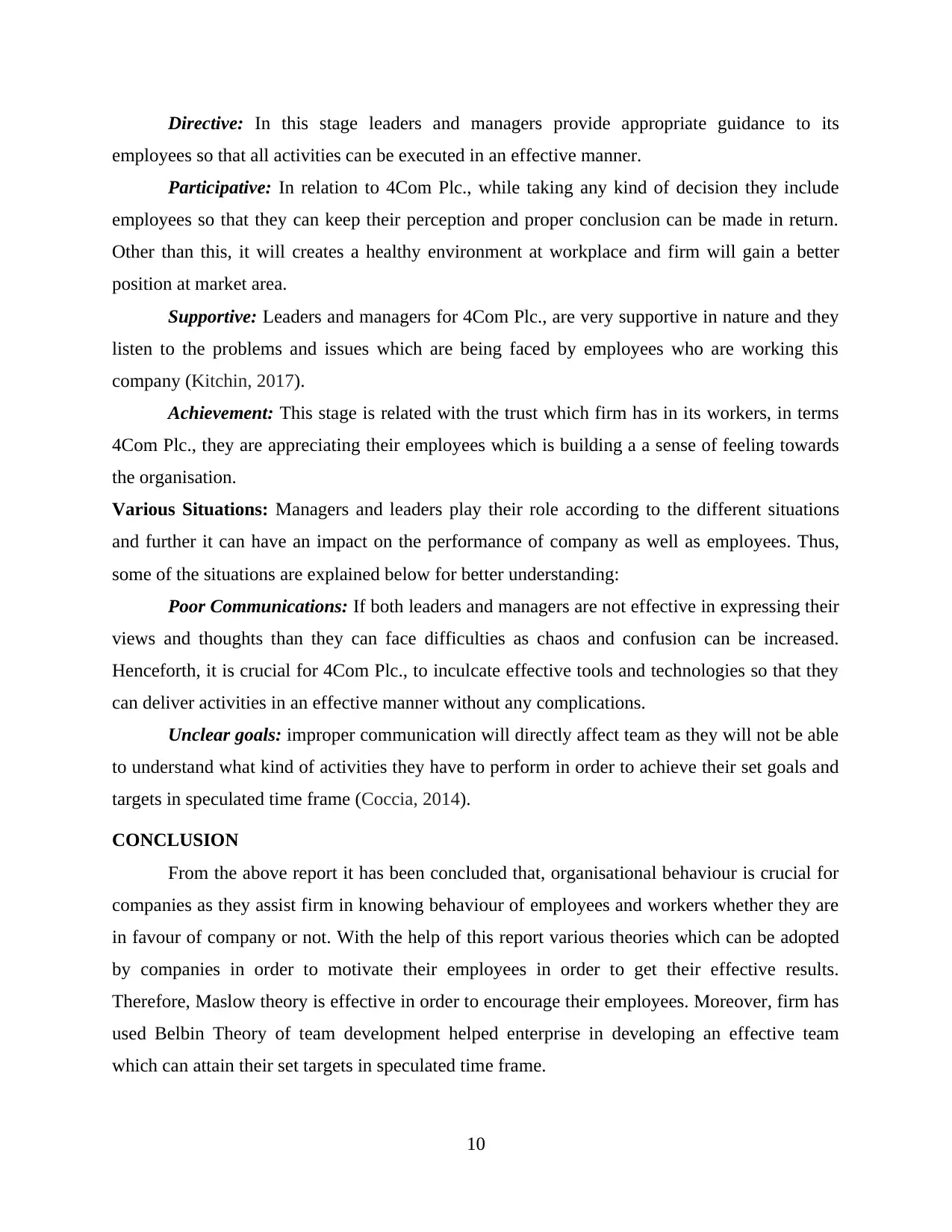
Directive: In this stage leaders and managers provide appropriate guidance to its
employees so that all activities can be executed in an effective manner.
Participative: In relation to 4Com Plc., while taking any kind of decision they include
employees so that they can keep their perception and proper conclusion can be made in return.
Other than this, it will creates a healthy environment at workplace and firm will gain a better
position at market area.
Supportive: Leaders and managers for 4Com Plc., are very supportive in nature and they
listen to the problems and issues which are being faced by employees who are working this
company (Kitchin, 2017).
Achievement: This stage is related with the trust which firm has in its workers, in terms
4Com Plc., they are appreciating their employees which is building a a sense of feeling towards
the organisation.
Various Situations: Managers and leaders play their role according to the different situations
and further it can have an impact on the performance of company as well as employees. Thus,
some of the situations are explained below for better understanding:
Poor Communications: If both leaders and managers are not effective in expressing their
views and thoughts than they can face difficulties as chaos and confusion can be increased.
Henceforth, it is crucial for 4Com Plc., to inculcate effective tools and technologies so that they
can deliver activities in an effective manner without any complications.
Unclear goals: improper communication will directly affect team as they will not be able
to understand what kind of activities they have to perform in order to achieve their set goals and
targets in speculated time frame (Coccia, 2014).
CONCLUSION
From the above report it has been concluded that, organisational behaviour is crucial for
companies as they assist firm in knowing behaviour of employees and workers whether they are
in favour of company or not. With the help of this report various theories which can be adopted
by companies in order to motivate their employees in order to get their effective results.
Therefore, Maslow theory is effective in order to encourage their employees. Moreover, firm has
used Belbin Theory of team development helped enterprise in developing an effective team
which can attain their set targets in speculated time frame.
10
employees so that all activities can be executed in an effective manner.
Participative: In relation to 4Com Plc., while taking any kind of decision they include
employees so that they can keep their perception and proper conclusion can be made in return.
Other than this, it will creates a healthy environment at workplace and firm will gain a better
position at market area.
Supportive: Leaders and managers for 4Com Plc., are very supportive in nature and they
listen to the problems and issues which are being faced by employees who are working this
company (Kitchin, 2017).
Achievement: This stage is related with the trust which firm has in its workers, in terms
4Com Plc., they are appreciating their employees which is building a a sense of feeling towards
the organisation.
Various Situations: Managers and leaders play their role according to the different situations
and further it can have an impact on the performance of company as well as employees. Thus,
some of the situations are explained below for better understanding:
Poor Communications: If both leaders and managers are not effective in expressing their
views and thoughts than they can face difficulties as chaos and confusion can be increased.
Henceforth, it is crucial for 4Com Plc., to inculcate effective tools and technologies so that they
can deliver activities in an effective manner without any complications.
Unclear goals: improper communication will directly affect team as they will not be able
to understand what kind of activities they have to perform in order to achieve their set goals and
targets in speculated time frame (Coccia, 2014).
CONCLUSION
From the above report it has been concluded that, organisational behaviour is crucial for
companies as they assist firm in knowing behaviour of employees and workers whether they are
in favour of company or not. With the help of this report various theories which can be adopted
by companies in order to motivate their employees in order to get their effective results.
Therefore, Maslow theory is effective in order to encourage their employees. Moreover, firm has
used Belbin Theory of team development helped enterprise in developing an effective team
which can attain their set targets in speculated time frame.
10
⊘ This is a preview!⊘
Do you want full access?
Subscribe today to unlock all pages.

Trusted by 1+ million students worldwide
1 out of 13
Related Documents
Your All-in-One AI-Powered Toolkit for Academic Success.
+13062052269
info@desklib.com
Available 24*7 on WhatsApp / Email
![[object Object]](/_next/static/media/star-bottom.7253800d.svg)
Unlock your academic potential
Copyright © 2020–2026 A2Z Services. All Rights Reserved. Developed and managed by ZUCOL.





